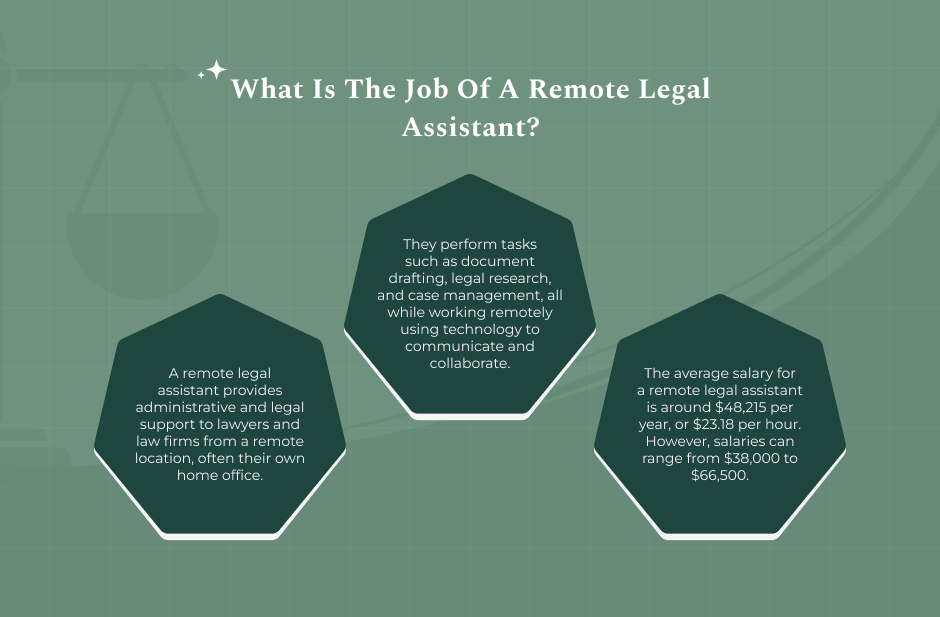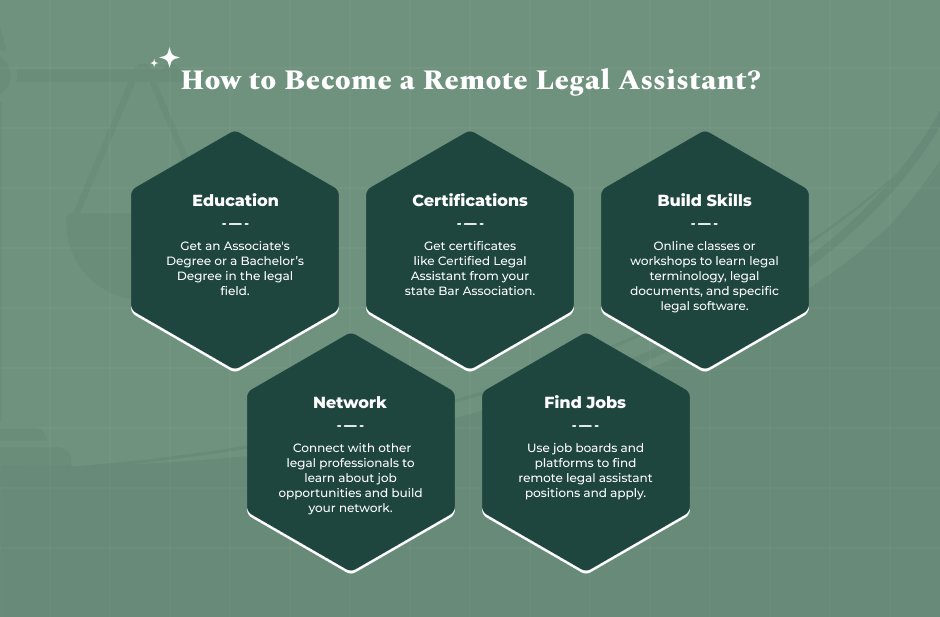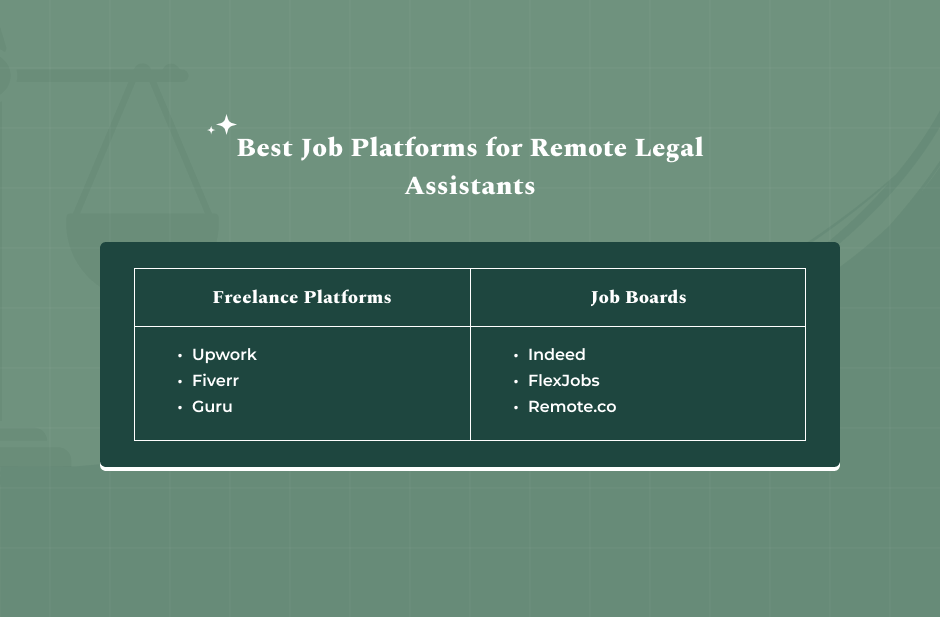A Remote Legal Assistant is someone who helps lawyers with their work, but they do it from home or anywhere with a computer and internet.
This job is growing fast because many law firms are now okay with people working remotely. With technology like video calls and cloud storage, legal work doesn’t always need to be done in an office anymore.
In this blog, I will explain everything about being a remote legal assistant—what they do, how much they earn, and why more people are choosing this career.
Even if you’ve never worked in law before, this article will help you understand how this job works and whether it might be the future for legal support roles.
Who is a Remote Legal Assistant?

Just imagine a remote legal assistant is a person who helps a lawyer. They don’t need to give legal advice or represent a client in a court. However, they still couldn’t be more useful to a lawyer.
And the cherry on top? They can do this job from their home, a coffee shop, or any place where the net connection is good.
Rather than being physically present, they perform their duties through emails, video conferences, and legal software. This position may be either part-time or full-time.
Some of them decide to work with only one lawyer or law firm, while others prefer to be freelancers and serve many at the same time.
Being a remote legal assistant still amounts to doing important work but gaining more liberty. You could work at the times that suit you best (some cases), avoid the hassle of traffic, and even be based in a different city or country than your employer.
What Does a Legal Assistant Do?
Legal assistants do a lot of things to help lawyers. Here are some common tasks:
- Organizing files: Making sure all papers are in the right place.
- Typing legal documents: Writing letters, contracts, and other legal forms.
- Research: Looking up laws and past cases.
- Scheduling: Booking meetings and reminding lawyers about court dates.
- Talking to clients: Answering questions or passing messages between the lawyer and the client.
In short, they keep things running smoothly behind the scenes so the lawyer can focus on big things like going to court or building a case.
Why are Remote Legal Assistants Becoming Popular?
There are three big reasons:
- Technology: We now have tools like Zoom, Google Drive, and legal software that make working from home easy.
- Money-saving: Law firms don’t have to pay for extra office space, and assistants don’t spend money on travel.
- Flexibility: Both the assistant and the lawyer can work from anywhere, which is helpful if someone moves, has kids, or just wants a better work-life balance.
Also, after COVID-19, many companies realized remote work can work. So now they’re more open to hiring legal assistants who don’t live nearby.
What is the Salary of a Remote Legal Assistant?
Salaries can vary, but here’s a general idea:
- In the U.S., remote legal assistants usually earn between $40,000 and $70,000 a year, depending on their experience, skills, and location.
- Freelance legal assistants might charge hourly rates—usually between $20 to $50 per hour.
The more experience and legal knowledge you have, the more you can earn. Some remote legal assistants even start their own businesses and work with many lawyers at once!
How Can You Become a Remote Legal Assistant?

You don’t always need a law degree to become a remote legal assistant, but these steps help:
- Finish High School: A basic requirement for most jobs.
- Get a Certificate or Associate Degree: Many schools offer short-term legal assistant or paralegal courses.
- Learn Online Tools: Know how to use email, calendars, Microsoft Word, Google Docs, and legal software like Clio or MyCase.
- Apply for Jobs or Freelance Work: You can work with one law firm or many. There are job boards and freelance sites you can use.
- Build a Good Resume: Show off your skills, experience, and any legal or computer training.
You can also join online communities to learn from others and stay updated with job opportunities.
What Skills Do You Need to Become a Remote Legal Assistant?
Most of the job of a legal secretary is supporting to legal practitioners to manage their work organizations.
The high-level skills that you have to master to do this job successfully are given below:
- Good writing and grammar: You are going to produce some business correspondence, legal documents, and also some emails.
- Strong organization: You should be sure to maintain the filing and the schedule in good order.
- Communication skills: Mostly you will be talking with lawyers and clients the most.
- Tech-savvy: Be sure that you are OK with computer, software, and online tools usage.
- Time management: Because there is no one for the supervision of your work, you have to keep your concentration and fulfill the tasks on time.
If you have these skills, then even if you do not come from the legal field, it is still no problem for you, because you can either get the rest of the skills on the job or learn through training programs.
What are the Best Remote Job Platforms for a Remote Legal Assistant?

Here are some websites where you can find remote legal assistant jobs:
- Upwork: Great for freelancers looking for short or long-term work.
- FlexJobs: Lists hand-checked remote jobs, including legal assistant roles.
- Indeed: Search for “remote legal assistant” and filter by location.
- LinkedIn: Many law firms post jobs here. You can also network with lawyers.
- LawClerk.legal: A site that connects freelance legal professionals with law firms.
Start by creating a strong profile, adding your resume, and applying to jobs that match your skills.
Is the Legal Industry Shifting to Remote Work?
Yes, slowly but surely.
Many lawyers now feel comfortable having their assistants work remotely. In fact, solo attorneys or small firms love it because it saves money and time. Big firms are also testing remote setups, especially for roles that don’t need in-office presence.
Let’s take a closer look:
Challenges of Remote Legal Work
It’s not always perfect. Some common challenges are:
- Communication delays: You can’t just walk to someone’s desk.
- Security concerns: Legal files are private, so strong online safety is a must.
- Feeling isolated: Working alone can be lonely sometimes.
- Time zone issues: If you and the lawyer are in different time zones, it can be hard to schedule meetings.
But with planning and good tools, most of these can be managed well.
The Future of Remote Legal Assistant Jobs
The future looks bright. More law firms are open to remote work, and clients are used to virtual meetings. Plus, people want jobs that offer flexibility, especially after the pandemic.
Also, AI and legal tech are growing fast. This means legal assistants will need to learn new tools but will also have help with boring tasks. Remote legal assistants who keep learning and improving will always be in demand.
In fact, this job may become one of the most common remote roles in the legal world.
Your Legal Guide: How to Become a Successful Remote Legal Assistant?
To be a successful remote legal assistant, you should put most of your effort into mastering three aspects:
- Skills.
- Equipment.
- Building a good reputation with others.
Learn time management, writing, and information gathering. Get familiar with internet-based applications and law-related programs.
And always be truthful, dependable, and courteous—because lawyers can only trust you if you give them the utmost professionalism.
This position is characterized by a few things:
- Liberty it comes with.
- High remuneration.
- Opportunity to develop yourself in the legal profession without the necessity to become a lawyer.
You can consider this route if you have just started your career or are searching for a new one.
The legal profession is evolving rapidly with remote legal assistants being the key agents of change.
If you are inclined to work efficiently, to grasp quickly, and to assist lawyers from any place, then the future is your playground.
Read Also:
















